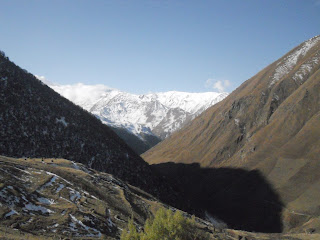One night this month the televisions in all of the houses announced in union that there would be snow this upcoming Sunday. Immediately this stirred conversation. Could it be that winter would come so soon?
Throughout the week the paths that run in between the households were sporadically blocked by piles of wood. The cars, no matter how clever their drivers were, could find no way around them and began to make detours. The local mshtrutka was not in the least pleased by this change in traffic. It was about as big of a panic that I can imagine the village finding itself in.
Yet everyday life still continued and the kids after school kicked their footballs and ran about doing whatever kids do. The older kids, the ones fortunate enough to have a computer, lurk inside their living rooms and play video games. All the students have the same video games; they lend them to one another and copy them onto their computers. Whether that’s legal or not is another matter, hardly worth enforcing since the games are all pirated anyways. Yet when they have issues with these games they typically wait outside for me to pass and drag me inside to fix whatever issues they are encountering.
Besides being kidnapped this week to help an 18 year old play some American Civil War game I was stopped by other students who either have a unique sense of curiosity or are just desperate for conversation. They stopped me, on my way home from school, to point out to me a tractor. It was a blue and large, quite rusty and drives up and down the main route in the village everyday accomplishing those feats that only tractors can accomplish. I’m not entirely sure as to what that is but no matter…
“Mike, do you love tractor?” asked the little boy anxiously, his eyes gleaming up as if his happiness for the next few days depended on my answer.
“Yes, of course.”
“Mike, this tractor Belarus,” he responded.
“Really? A Belarus tractor?”
“Yes. Belarus. It is good tractor. You like?”
“Yes. Very much.”
He wasn’t alone and they all began jeering and clapping. Perhaps this is some strange joke or perhaps this really is a cause for celebration. A few days later however, I noticed something slightly odd in the class room. It was in the early afternoon and we had just finished with one exercise and there was a brief moment of silence. Then from the distance the sputtering noise could be heard and the sound of the rough engine got closer. Their eyes peered dreamily out the window, as they always do when there is a sound or movement and as the tractor approached one raised his hand and asked, “Mike do you love tractor?”
“Yes I do.”
“You like tractor Mike?” he asked again, attempting to confirm my appreciation for the blue smoke sputtering monster.
“Yes. I drive tractor. I have many tractors. I love tractors.” These words just came out attempting to deflect or rather deflate any upcoming questions regarding the tractor. And then the inevitable:
“Mike this tractor Belarus.”
I acted stunned. “Belarus,” I stammered. “There is no way.” The suspense was built and the class reacted so.
So far the issue of the Belarusian tractor has died down. Its luster no longer delivers classroom prate and this is why. The students have discovered an internet tractor game. It is the rage. Out of all the things that the internet offers the tractor game seems to be the cream of the crop. Thus a war has been sparked between the young and the adolescents, the tractor game versus Spongebob Squarepants. It’s a daily battle filled with screams and tears and then more screaming. But that’s ok, because at least they’ve stopped playing with fire.

















